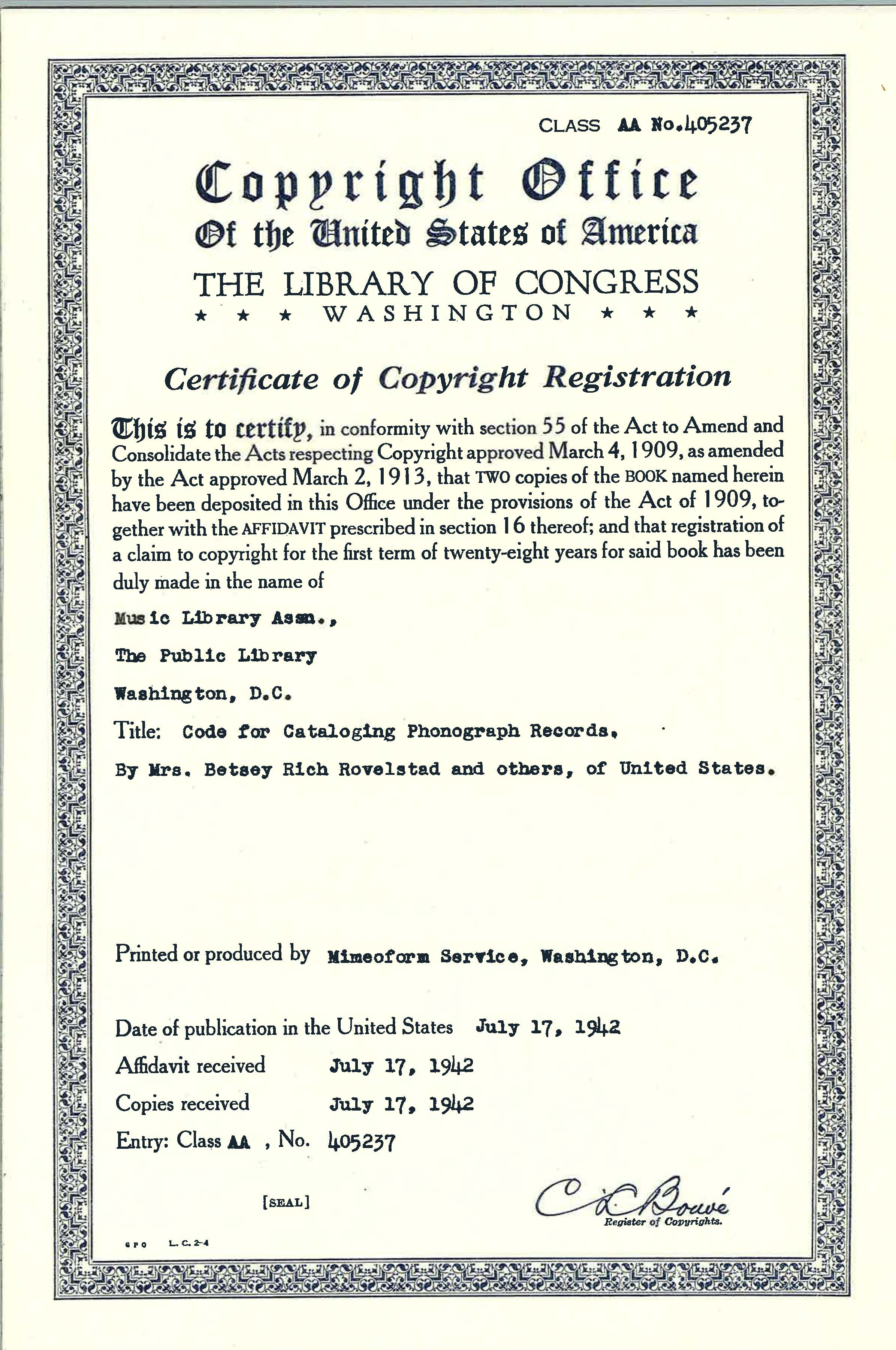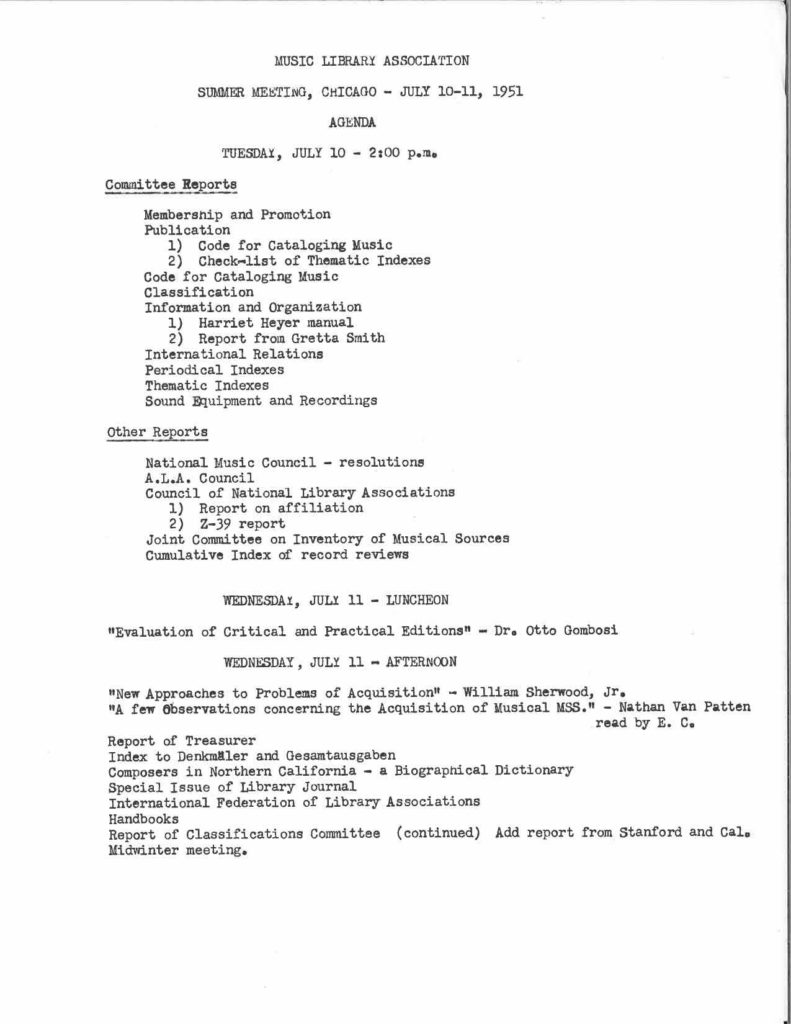By Christina Taylor Gibson and Melissa Wertheimer
This article emerged from a series of wide-ranging conversations between the incoming MLA Archivist (Christina) and the outgoing MLA Archivist (Melissa) about how to fulfill their official charge during the pandemic. We share this summary to give MLA members a better sense of how the MLA Archives function, its goals and scope, and how MLA members can contribute to this work.

Part of the MLA records, Special Collections in Performing Arts, University of Maryland.
This spring at its 90th anniversary meeting, MLA announced a new slate of officers – in the middle of the coronavirus pandemic and a historic online conference. Many of these new appointees have taken on positions that fundamentally changed due to pandemic realities. One of those is the MLA Archivist position.
The differences between this year and previous years were dramatic. We all experienced this in personal ways. Most of us moved from our institutional offices to our home offices, trading the distractions of officemates for the distractions of roommates. Too many of us did this while processing various forms of grief and trauma—separation, illness, mourning, financial distress—the warp and weave of pandemic tragedy.
The MLA Archives also faced restrictions. The University of Maryland College Park campus, where the collection is housed, closed to the public in March 2020. All employees were encouraged to work from home if possible, including processing archivists and student workers. A few months later employees were allowed to return for a few hours every week, but no new accessions were permitted. By summer 2021, full-time capacity was permitted if needed. But although UMD was processing electronic additions to the archive, l it was not accepting paper accessions.
As a consequence, the usual level of collecting, processing, reference, and engagement simply could not take place, leading to all sorts of awkward and somewhat comic interactions. For example, Melissa had committed to reading a plenary paper at the Spring 2021 meeting to celebrate MLA’s 90th anniversary. It felt maddening and bizarre; she knew which records she needed to consult, exactly which shelves and drawers, yet they were off-limits less than 10 miles away. Through several emails and phone calls with Christina, who works in Special Collections in Performing Arts at UMD and could access the collections on a weekly basis, they gathered the images and information necessary for that presentation.
Additional challenges began when Christina was appointed to the position. Melissa had kept a running list of people waiting to transfer records, including a person who was retiring and had a short window to clean out their office that contains MLA records from their leadership positions. Because full shipping services had not resumed at UMD and accession restrictions were still in place, the MLA member mailed the box to Christina’s home for integration into the collection post-pandemic.
Realizing the strangeness the pandemic introduced into our own lives led us to reflect on the ways in which the association as a whole was navigating similar obstacles. The most obvious of these was the online meeting—the first of its kind in the history of MLA. Every speaker and attendee contended with new ways of interacting, from reserving spots in SCHED to answering questions through a chat or Q&A function to networking in our pj’s on Remo.
The meeting left us with more documentation than ever before. In addition to the PDF program itself, we have recordings of every speaker. For many papers, we also have submitted text and slides. Theoretically, these are things we could collect and add to the archive, but final session materials aren’t part of the records retention schedule, and speakers did not grant permission for collecting, so there is not a clear way forward. The program itself can certainly be accessioned as it has in decades past, and parts of the program, such as President Susannah Cleveland’s remarks, will hopefully make their way into the repository when officers donate their papers.
Nonetheless, it might also be worthwhile to revisit our current policies and systems to encourage more collecting centered on the annual meetings..
Although a wholesale change in collecting and organizational practices is impractical given that this is a volunteer position, this moment points to ways that we might adjust slightly to encourage more collecting around the annual meeting. For example, given the continued option to give papers in a virtual format, we might think about arranging to have papers preserved and retained. Or, we might simply revise the retention schedule to add something about collecting at or after the meetings. In any case, for many the meeting is central to the organization’s culture and our sense of belonging, and that ought to be reflected in the collection.
Another area likely to be affected by the pandemic are publications, such as Notes and MLA’s series published by A-R Editions e hope editors will send copies of all print and electronic MLA publications to the repository and, once their term is ended, will also send papers that document the peer-review and editorial processes during this peculiar moment. We are conscious, however, that all of the officers, like the rest of us, are going through a new balancing act, so our collecting realities may not meet our collecting ideals.
In addition to the practical obstacles, there are philosophical ones. Throughout our conversations, we kept returning to the question of “audience.” The MLA archives, like many organizational collections, do not have a singular user base. One motivation for creating and maintaining such a collection is to be able to use the past to guide the future. For example, as we navigate the racial justice imperatives of the current moment, we might look at dynamics around race and gender in the past, as they emerge in oral histories, official statements, scholarship, and meeting program themes.
If the purpose of the MLA Archives is to inform present and future practice, then the audience for the collection is the membership, and the Archivist should be most focused on making the MLA Archives legible and meaningful to MLA members. Certainly that is part of the MLA archivists’ mission, as reflected in Melissa’s conference presentations, exhibits, and Newsletter articles from 2017-2021. Christina has likewise taken up this charge by initiating the conversations that formed this article.
But the MLA archives have material of interest to those outside the Association, which is why Melissa prioritized writing finding aids for records groups like Oral Histories and Notes That material includes Henry and Sidney Cowell correspondence; oral histories featuring our profession’s luminaries Dena Epstein, William Lichtenwanger, and Lou Harrison; and materials from the early days of the Association chronicling librarians’ role in music diplomacy. Historians, musicologists, librarians, and performers outside our organization might find this material interesting but, for the most part, engagement as remained internal. Maybe collection advocacy can reverberate outwards from the MLA Archivist to MLA members who spread the word to their colleagues, friends, and students about the gems that await them in the SCPA stacks.
As in a natural ecosystem, the gradual growth of the collection means that it requires ever more care and attention, and we rely on MLA members to donate papers that document their official duties, inquire about our holdings, and help write the narratives that will shape the future of the MLA Archives and our organization. This is especially true as we navigate through the pandemic, developing new kinds of documentation for a new moment. Please be bold in contacting Christina and future archivists about donating materials, even if you are not sure whether they are appropriate. We can think through what fits and tells our story together.

